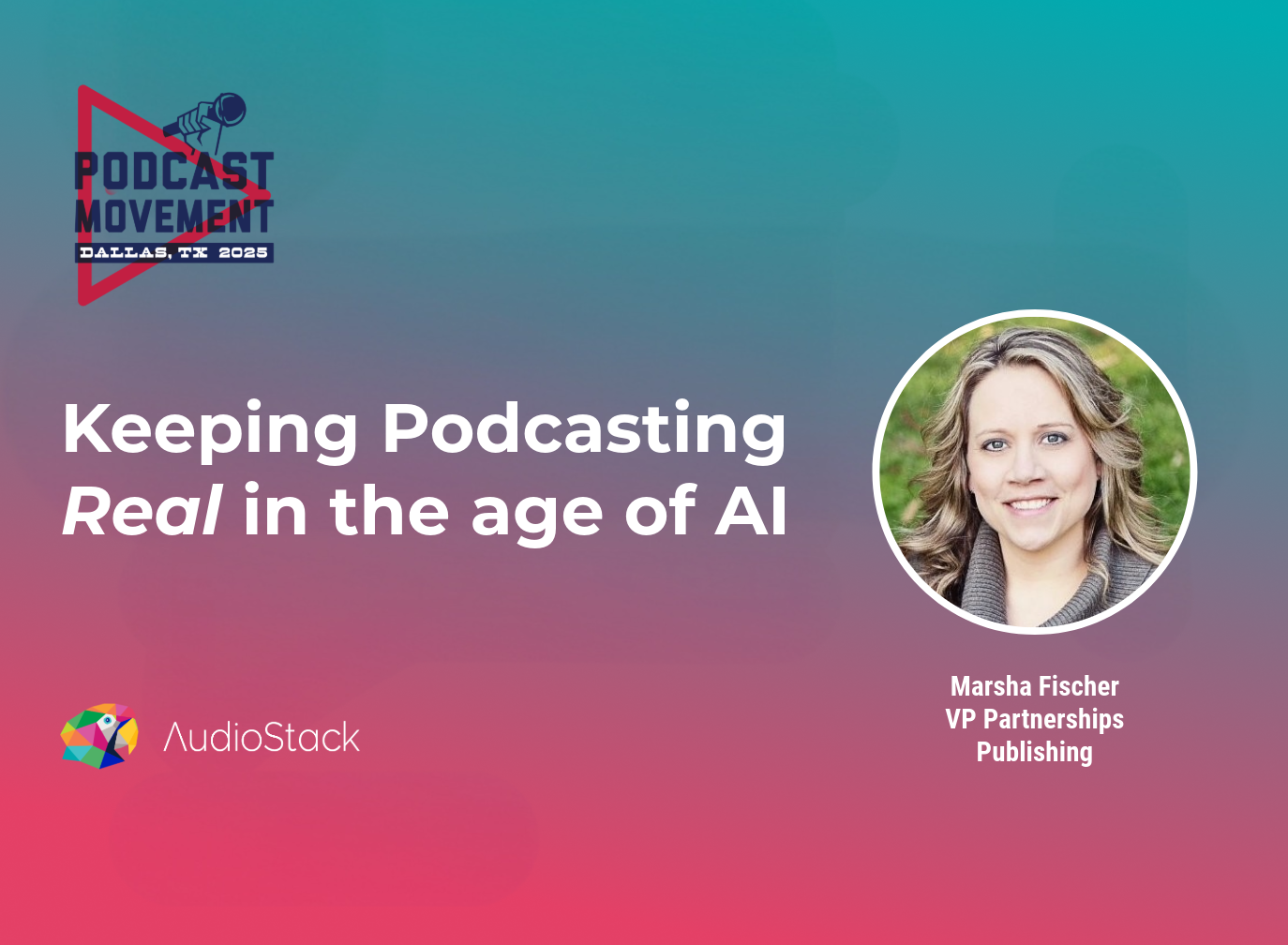AI Transformation
Podcast Movement 2025 – How to keep podcasting real in the age of AI.
AI has come for podcasting. But it’s not the threat it sounds like. In fact, it’s an opportunity to scale creative production and reach audiences with messaging that’s more relevant, personal and valuable. Looking for the big AI talking points that will influence podcasting in 2026? You’re in the right place.

Marsha Fischer
August 29, 2025

Video podcasting. A seismic Sounds Profitable x Podcast Movement merger. And more than 100 talks and workshops from the biggest names in commercial podcasting.
It’s little surprise that a Podcast Movement in Texas would do it bigger and better.
But for us – and many of you – the open secret was AI audio.
Why?
Because it’s only getting better. And both podcast producers and advertisers have been taking advantage of it.
So if you’re looking to catch-up on what you missed in Dallas, or understand the opportunity that AI audio is bringing to podcasting, you’re in the right place.
#1 The “three schools” of AI audio adoption.
Every year, regardless of the event, everyone in the podcast ecosystem understands AI audio’s capabilities a bit better. From the tools to ideate content to the workflows that generate, produce and distribute it.
And in that same period of time, those capabilities develop tenfold. For instance, we have many more lifelike multilingual voices than we did last year. We can version thousands of hyperlocalized ads from data for dynamic ad insertion (DAI) completely automatically. The list goes on.
Exciting? Definitely. Concerning? To some.
In our conversations, we found there were generally three schools of thought regarding AI audio adoption.
The ‘all-in’ adopters – who are open to AI in every facet of podcasting: content creation, ideation, strategy, production efficiency…
The creative purists – who value a human-only approach, resisting AI to preserve creator authenticity.
The hybrid adopters – who are a little from column A, and a little from column B – using AI in limited ways (automating production or creative ideation).
And in our experience? The second group is diminishing – but not because of any AI defeatism. It’s because they are transferring into the third group. Why? Well…
#2 Reality Check: AI is only getting better. So how do we take advantage of it?
In 2025 (and just the past few months), we have seen a few use cases for AI audio that have raised the bar:
Google’s Native Speech Generation capabilities have enabled real-time conversation with lifelike AI voice, and through Notebook LM (which launched 12 months ago), users can now generate interactive subject-matter podcasts in 80+ languages. Freely and accessible to anyone.
The release of ElevenLabs v3 has set the highest standard in AI-generated voice synthesis, paving the way for mass deployment of conversational AI agents.
News publishers have cloned top journalists’ voices in hours – ready to deliver daily news podcasts using nothing more than a script and automation (such as Larissa Holzski, who reads Handelsblatt’s AI Briefing).
And the kicker? AI audio will only get better. More believable. More elaborate.
But if that means we should wave goodbye to podcasting as we know it, the direction of travel is likely to veer elsewhere.
Because in each of those instances – and many more that we shared from AudioStack – GenAI has been the tool to make production of the final product quicker, faster, more scalable.
When publishers and podcasters use AI, they leverage things only human operators can intuit:
Host chemistry
Audience enthusiasm
Content that will resonate
And when over 155 million people listen to podcasts every month in the USA alone, AI delivers the scale and the reach, but only human operators will know for sure if the product will land.
Key Takeaway: Every publisher decides how far they lean in. The key is flexibility.
#3 Experts unveil where and when to use AI to go beyond the ad read.
In a context where brands are truly wise to the dollar value of host-listener relationships, we moderated a panel dissecting the key vehicle for podcast monetization – host read-ads.
But with AI rearing its head, and more than a handful of examples of host-voice cloning ‘in the wild’, we debated a key question: if a cloned voice sounds just as good as the host themselves, why do things the ‘old-fashioned way’?
The answer we got was insightful:
Ad Reads leverage genuine connections between brands and creators: and there’s nothing more dynamic and genuine than an ad read by a host, off-the-cuff – especially when using the ad read to propel conversation with the co-host(s).
Still, that doesn’t mean there’s no place for AI audio in host-read ads. Tools that generate creative concepts, version dynamic ad reads and reduce production time are still very valuable to hosts and production teams. But whether or not host voice cloning for ad reads will work is a matter for audiences to decide.
Key takeaway: Embrace the technology, and deploy it contextually.
Final Takeaway: Keeping podcasting real in the age of AI
Going into Podcast Movement, we anticipated a lot of questions around implementation. How much time can AI save to deliver thousands of ads for dynamic insertion? What written formats can be adapted into podcasts, automatically?
We heard all of those and more. But the ‘vibe’ around AI audio in podcasting – now that it has reached a level where its products are indistinguishable from human voice and expert production – is more existential.
Will I be able to trust what I hear?
Will we produce 100x the content at 10% the quality?
Will podcasting be authentic any more?
Just before Podcast Movement, we heard from Aaron Matthews, a producer for over 20 years and founder of audio agency, Original Audio.
He summed up AI’s place in podcasting and audio creation better than anyone else.
At AudioStack, our mission is simple: we want you to use AI to remove the barriers to audio production so you can focus on ideas, strategy, and storytelling. It’s not about replacing creators. It’s about letting tech take care of the heavy lifting.
AudioStack equips creators with new levers to push audio forward, using AI as a competitive edge. Want to see how it can work for your podcast production company, brand or publisher?
Why not read our whitepaper, or scroll down to see what publishers are doing with AI audio?
About AudioStack
AudioStack is the world's leading end-to-end enterprise solution for AI audio production. Our proprietary technology connects AI-powered media creation forms such as AI script generation, text-to-speech, speech-to-speech, generative music, and dynamic versioning. AudioStack unlocks cost and time-efficient audio that is addressable at scale, without compromising on quality.

